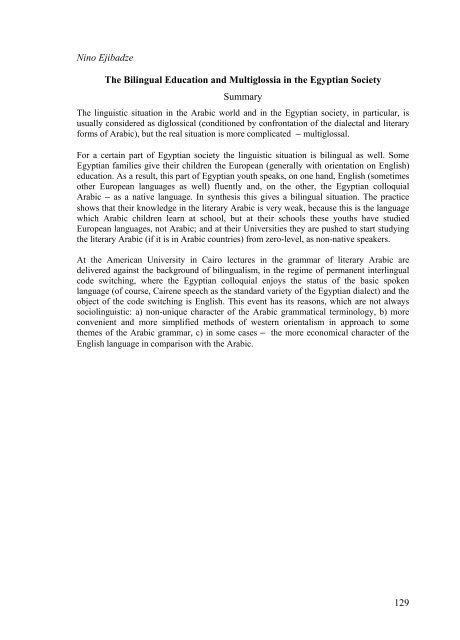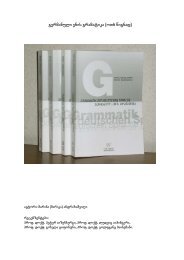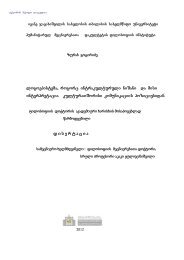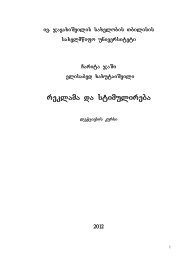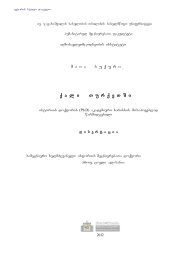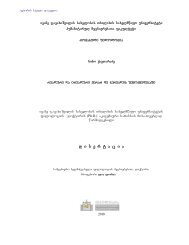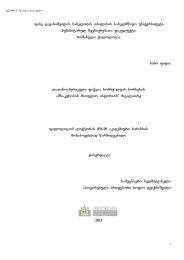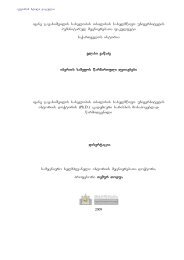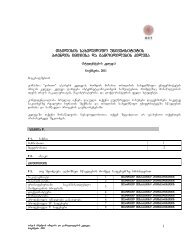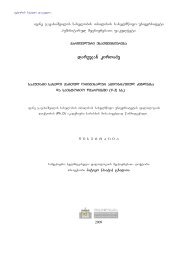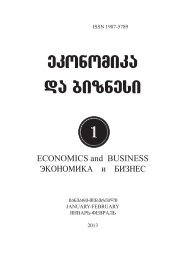- Page 1 and 2:
ivane javaxiSvilis saxelobis Tbilis
- Page 3:
krebuli eZRvneba jemSid giunaSvilis
- Page 6 and 7:
1974 8. Краткий русско
- Page 8 and 9:
13. K толкованию терм
- Page 10 and 11:
1982 43. Историческая
- Page 12 and 13:
12 2002 68. islamuri reglamentacia
- Page 14 and 15:
19. Alefbāye Gorgài , Tehrān, 13
- Page 16 and 17:
nawerTa erovnul centrSi (www.manusc
- Page 18 and 19:
turul arealSi Semavali qveynebis en
- Page 20 and 21:
marina aleqsiZe 20 enaTmecnierebis
- Page 22 and 23:
yvani nawilia avtoris remarka, mas
- Page 24 and 25:
terminiT `dialoguri replika~ ki - p
- Page 26 and 27:
"Ведь вот, _ подумал
- Page 28 and 29:
"Ну, говори жe, говор
- Page 30 and 31:
fati anTaZe-malaSxia 30 enaTmecnier
- Page 32 and 33:
||„ziraki~ (neimani 1978); „zir
- Page 34 and 35:
nasesxeb erTeulebs, magaliTad, zemo
- Page 36 and 37:
dasturdeba „visramianSic~: „dia
- Page 38 and 39:
ki spontanurad Cndeboda Targmnis pr
- Page 40 and 41:
ikatizaciis tendenciis TvalsaCino m
- Page 42 and 43:
Sah-name 1934: firdousi „Sah-name
- Page 44 and 45:
naTia arabuli 44 enaTmecnierebis sa
- Page 46 and 47:
mkveTrad SemosazRvruli, rac mis nak
- Page 48 and 49:
isas: ‘xexilis gasxvla’, ‘xex
- Page 50 and 51:
kiTxva ratom damebada, zustad ar ma
- Page 52 and 53:
avSvebs vTxovT: calke gadade yvela
- Page 54 and 55:
2. meore eqsperimentis Sedegebi inf
- Page 56 and 57:
am formuliT gadaTvlili monacemebis
- Page 58 and 59:
akaki, 6 wlis, hyavs 2 ufrosi da, d
- Page 60 and 61:
• eqsperimentebis Sedegebze, rogo
- Page 62 and 63:
krofti, kruzi 2005: u. krofti, a. k
- Page 64 and 65:
lime wevris logikuri gamokveTis miz
- Page 66 and 67:
(15)-Si rom aucilebelia, gansakuTre
- Page 68 and 69:
23. mu (r)en, na Warums? ra aris, r
- Page 70 and 71:
• It is not expected to find a pr
- Page 72 and 73:
sulSi ganxorcielebula da arc axla x
- Page 74 and 75:
iseT enebSi, sadac ar aris warmodge
- Page 76 and 77:
Tomsenis mosazreba, romlis Tanaxmad
- Page 78 and 79: Semoklebebi 1p _ pirveli piri 3p _
- Page 80 and 81: Shemirān. 1 Its chapter on Shemir
- Page 82 and 83: “when”, ofdâ- “fall”, dâ
- Page 84 and 85: Note also min “in the middle“ a
- Page 86 and 87: occasionally in formal Persian, e.g
- Page 88 and 89: Kāš. vâred migedian “they woul
- Page 90 and 91: “go” from Persian, it caused th
- Page 92 and 93: of A.D. 1679), and m (= H 2135, of
- Page 94 and 95: When initial *u» was followed by a
- Page 96 and 97: of course, that Persian is well equ
- Page 98 and 99: compound *šāhāØnduxt. ‘daught
- Page 100 and 101: pirad; 3. LXX: angelozi; 4. warmarT
- Page 102 and 103: 1.6. sainteresoa angeloz-is xmarebi
- Page 104 and 105: 2.1. ebr. birK, bWrK, ~ybirK.h;;; b
- Page 106 and 107: gansxvaveba am sityvebiT aRniSnul c
- Page 108 and 109: mark. 1.13 da iyo mun ormeoc dRe da
- Page 110 and 111: weldaRma _ virTasa ZAB. ese ars, ro
- Page 112 and 113: eSmakis simbolo, eSmakis Zala trans
- Page 114 and 115: gan TWsTa qvisa mis mcirisa SurdulT
- Page 116 and 117: Hatch E., Redpath H.A., A Concordan
- Page 118 and 119: *mai{a-, кл. перс. me{, др.
- Page 120 and 121: имеет значение "вой
- Page 122 and 123: Таково тадж. sano~ 1) "б
- Page 124 and 125: Morgenstierne 2003: Morgenstierne G
- Page 126 and 127: a. silagaZe e.w. standart-enis Sesa
- Page 130 and 131: marine ivaniSvili 130 enaTmecniereb
- Page 132 and 133: eWvoa; ufro savaraudoa, semituri fu
- Page 134 and 135: В.Б. Иванов 134 enaTmecnier
- Page 136 and 137: древнеперсидском и
- Page 138 and 139: Второго сближения (
- Page 140 and 141: В своей работе, пос
- Page 142 and 143: vaxtang imnaiSvili 142 enaTmecniere
- Page 144 and 145: gabriel mcire `gabriel mcires origi
- Page 146 and 147: гда не работал с те
- Page 148 and 149: le~ Zalze iSviaTad ki `mefe Tamaric
- Page 150 and 151: Vakhtang Imnaishvili One Specific C
- Page 152 and 153: enis codnis xarisxi, rogorc momaval
- Page 154 and 155: i saintereso suraTs gvixatavs migra
- Page 156 and 157: aSi ar dasturdeba rigi enobrivi mov
- Page 158 and 159: deSerievi, protCenko 1972: Деше
- Page 160 and 161: Gilbert Lazard 160 enaTmecnierebis
- Page 162 and 163: Il est intéressant de constater qu
- Page 164 and 165: vladimer lekiaSvili 164 enaTmecnier
- Page 166 and 167: diqotomiis _ apriorizm-aposterioriz
- Page 168 and 169: nebis epoqaSi abstraqtul obieqtebze
- Page 170 and 171: 170 enaTmecnierebis sakiTxebi _ 201
- Page 172 and 173: isic unda iTqvas, rom rusuli ena as
- Page 174 and 175: qeTevan megreliSvili 174 enaTmecnie
- Page 176 and 177: 176 da Tu varskvlavi samarTals ar m
- Page 178 and 179:
semantikurad axlos dgas qarTul gamo
- Page 180 and 181:
no z. sarjvelaZis mier ganmartebuli
- Page 182 and 183:
expressions are derived from tāvā
- Page 184 and 185:
qarTvelur da kavkasiis sxva enebSi
- Page 186 and 187:
186 saerTo- qarTveluri Zveli qarTul
- Page 188 and 189:
dawyebuli araharmoniuli kompleqsebi
- Page 190 and 191:
distanciuri mimdevrobebis mixedviT
- Page 192 and 193:
2. decesiur distanciur kombinacias
- Page 194 and 195:
svanurSi ki rusuli yruebi ufro xSir
- Page 196 and 197:
xevis dawyebamde periodis saSualo g
- Page 198 and 199:
iTadi toniT an maRali toniT. magali
- Page 200 and 201:
literatura 200 skdoma _ Burst ubger
- Page 202 and 203:
Georgian and in the dialects of Sva
- Page 204 and 205:
fatikuri~. glotalizebuli saxiTaa is
- Page 206 and 207:
amgvarad, xSulTa sistema yvelaze me
- Page 208 and 209:
amgvari minimalurad gansxvavebuli f
- Page 210 and 211:
Marina Meparishvili Modified System
- Page 212 and 213:
zian“ (TaziaTa meTauri, xelmwife)
- Page 214 and 215:
leba iqna Setanili TqmulebaTa perso
- Page 216 and 217:
maia saxokia 216 enaTmecnierebis sa
- Page 218 and 219:
1. erTi da igive morfologiuri forma
- Page 220 and 221:
i masdarebi da zogadad ie ormagi ak
- Page 222 and 223:
(Acc/Loc/Gen/Dat). xolo farTo tipol
- Page 224 and 225:
sazRvreba rogorc eqsperienceri (grZ
- Page 226 and 227:
dominirebs e.w. specializebul akuza
- Page 228 and 229:
zmnebi da paronomaziebic: „aqleme
- Page 230 and 231:
paralelebis SemTxvevaSi ki vlaparak
- Page 232 and 233:
Zvelsparsul warweraTa masalaze mosa
- Page 234 and 235:
234 tabula 1 tabula 2
- Page 236 and 237:
kempfi 1973: Kempf E., Semantic sco
- Page 238 and 239:
saxokia 2010d: m. saxokia, aqemenid
- Page 240 and 241:
Agency (SergAgObl); 5. The Adverbia
- Page 242 and 243:
Texte géorgien Un bifolio originel
- Page 244 and 245:
Sonja Gippert-Fritz 1. Anthroponyme
- Page 246 and 247:
Dzan ist in dieser Form im Ossetisc
- Page 248 and 249:
im Namen Dzynga vor, der das osseti
- Page 250 and 251:
tischer Männername im Gedenken an
- Page 252 and 253:
Westkaukasischen, das innerhalb der
- Page 254 and 255:
Eines der produktivsten Elemente is
- Page 256 and 257:
verschiedenenorts im Kaukasusgebiet
- Page 258 and 259:
gvevlineba. reprezantaciis anu samy
- Page 260 and 261:
am mxriv teqstebis funqcionalobis m
- Page 262 and 263:
• semantikuri mimarTebebis gaaqti
- Page 264 and 265:
Gardt 2007: Gardt Andreas, Diskursa
- Page 266 and 267:
uli bgeris Seswavlis ori aspeqti: f
- Page 268 and 269:
maSin rodesac wina poziciaSi T-s so
- Page 270 and 271:
feriuli arabuli dialeqtebis xangrZl
- Page 272 and 273:
gamomxatveli, xolo, meore mxriv, mr
- Page 274 and 275:
eduqciis xarjze klasikuri sistema g
- Page 276 and 277:
zÝkÁt z - -Át mdedr. mr. ziklÆn
- Page 278 and 279:
278 II mamr. âÁribak mdedr. âÁr
- Page 280 and 281:
daskvna ganxiluli kvleviTi mimarTul
- Page 282 and 283:
qeTevan ZiZiguri 282 enaTmecnierebi
- Page 284 and 285:
aris sxvadasxva xarisxis cocxali an
- Page 286 and 287:
zevss warmosaxavdnen. am SemTxvevaS
- Page 288 and 289:
amrigad, losevi sityvis agebulebis
- Page 290 and 291:
magram 20-30-ian wlebSi berebis ume
- Page 292 and 293:
292 enaTmecnierebis sakiTxebi - 201
- Page 294 and 295:
gardauvali ausziehen (igive wegzieh
- Page 296 and 297:
hipipotaqsur konstruqciaTa saxeobeb
- Page 298 and 299:
marine ivaniSvili, mcenareTa saxele
- Page 300:
gamomcemlobis redaqtorebi: cira jiS


